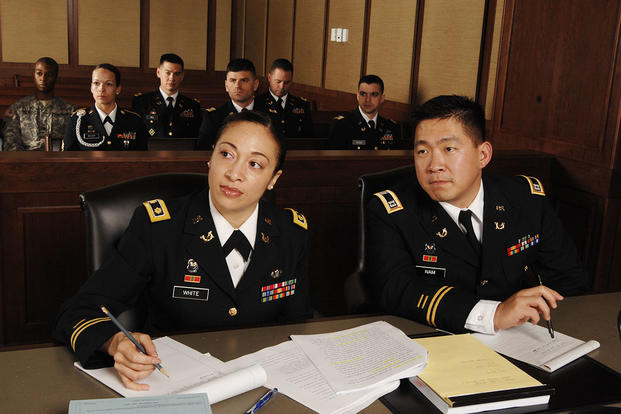As the services grapple with how best to address disparities in military punishment, they should create a more racially diverse Judge Advocate General Corps, according to a former military prosecutor.
Speaking to the House Armed Services Subcommittee on Military Personnel, Don Christensen, president of Protect Our Defenders and a retired Air Force colonel, said he is concerned with the lack of African American representation in top JAG positions.
Read Next: First Army Unit Gets New Squad Designated Marksman Rifle
When he retired in 2014, Christensen, who was also the Air Force's chief prosecutor, said he knew of one African American out of 124 colonels in the branch's JAG Corps.
"We do not have enough," he said during the hearing Tuesday, held to address racial disparities in the military justice system.
Selection and promotion boards should be encouraged to transform the JAG Corps "because I think part of the experience [minorities] would bring in would be important to [eliminate] bias," Christensen said.
As the national conversation on race has renewed in recent weeks following the May 25 death of George Floyd, a black man, in Minneapolis, Christensen highlighted how the services -- most notably the Air Force -- have come up short on the issue.
Last month, Protect our Defenders published a new study, "Federal Lawsuit Reveals Air Force Cover Up: Racial Disparities in Military Justice Part II," which followed its report from 2017. The studies found that black troops "are twice as likely to be investigated compared to white servicemembers in each branch."
A subsequent 2019 Government Accountability Office study came to the same conclusion.
According to slides obtained through a federal lawsuit to supplement its Freedom of Information Act request, Protect Our Defenders found in its latest report that the Air Force openly admitted through a 2017 working group analysis that racial injustices are prevalent and enduring.
The most junior ranks bear the brunt, according to another slide.
"The rate per thousand of Black/African American Airmen receiving discipline at the E-2 level is double that of other demographics," it states, referencing data collected between 2012 and 2016.
Separately, in a letter addressed to the Air Force JAG Corps, Lt. Gen. Jeffrey Rockwell, the service's judge advocate general, queried his counterparts earlier this month, asking for proposals on how to improve the service's justice system, including solutions to "break down barriers" and conduct further analysis.
Rockwell cited an internal report that found similar data to Protect our Defenders' studies.
Slides accompanying the letter showed that black male airmen "under the age of 25 and with less than 5 years of service receive non-judicial punishments and courts-martial actions at a higher rate than similarly situated white male Airmen," especially at the E-5 level and below, Rockwell said.
The Air Force Inspector General has since launched an independent review into the service's history of military discipline.
Rockwell testified at Tuesday's hearing, alongside Maj. Gen. Daniel Lecce, staff judge advocate to the Marine Corps' commandant; Lt. Gen. Charles Pede, the Army's judge advocate general; and Vice Adm. John Hannink, the Navy's judge advocate general.
"I think you measure progress by eliminating that racial disparity," Rockwell said in response to Rep. Debra Halaand, D-New Mexico. "I think that has to be the ultimate goal of where we should get to."
"We have to get after this," Lecce added. "We realize we're at the beginning ... but there is a lot of work to be done. … Commanders need to drive this."
Committee Chairwoman Rep. Jackie Speier, D-California, agreed with Lecce that responsibility starts at the top, but noted that Congress had already been pushing the issue. The fiscal 2020 National Defense Authorization Act, under section 540-I, mandated assessments into racial, ethnic and gender disparities in the military justice system.
"540-I was put in the 2020 defense authorization act not by you, not at your request, but at Congress' request," she said. "So while you're relying on that now to recognize that there is work to be done, it would have been a whole lot better if it came from you."
-- Oriana Pawlyk can be reached at oriana.pawlyk@military.com. Follow her on Twitter at @Oriana0214.
Related: 'Acting with Their Heart:' How the Air Force Led the Services in Talking About Race













